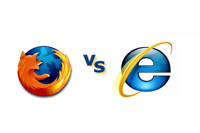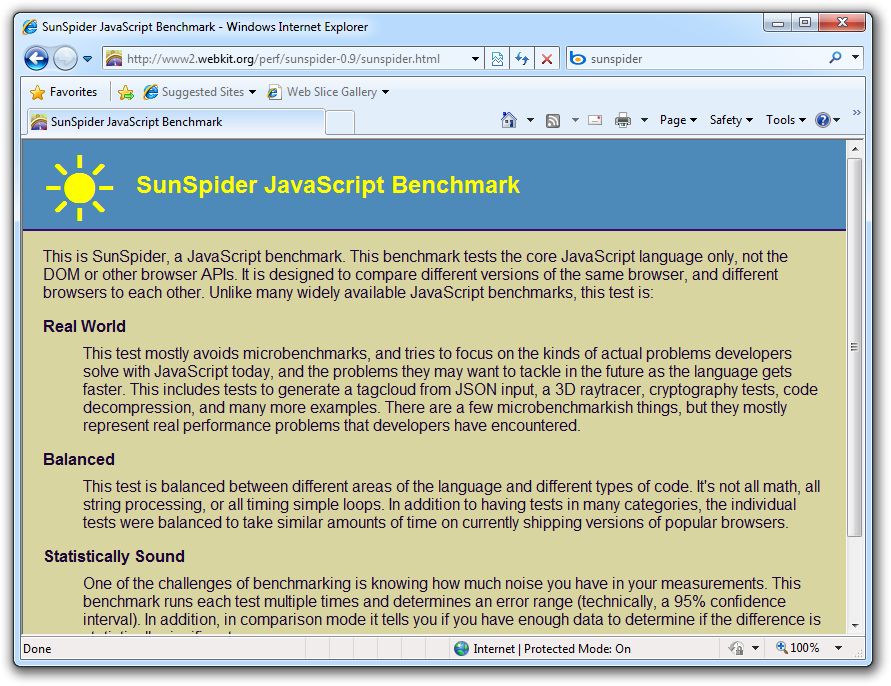Head to head: Firefox vs Internet Explorer
In our latest head to head, we weigh up the web's most popular browsers: Microsoft’s Internet Explorer and Mozilla’s Firefox.


There are several aspects to browser performance. At the simplest level, there's the question of how quickly a browser can render a page. Here, the "Gecko" rendering engine used by Firefox is well known to be faster than the IE8 internal engine Microsoft admits as much on its own "browser comparison" page.
However, the company also makes the valid point that, on a modern PC, both can lay out complex HTML and CSS pages in the blink of an eye; the limiting factor is more likely to be the speed of your internet connection. The company argues that, in terms of performance, the two browsers are therefore tied.
Yet rendering speed isn't the only factor to consider. RAM usage is important too, especially if you're looking for a browser to run on a low-power netbook. To see which browser is more memory efficient, we carried out a simple test, opening a list of tabs and closing them again. When first loaded, IE8 consumed just 13MB of system memory, but once we'd opened all our sites including a Google search and a YouTube video this had gone up to 116MB. Firefox required a higher 28MB to load up, but then consumed only 91MB with all tabs open. On a modern system, 25MB here or there is insignificant, so for simple surfing the two browsers are indeed more or less tied.
A final consideration is JavaScript performance. Many modern websites use JavaScript to deliver "web applications" that run in your browser, and the more rapidly your browser can execute JavaScript code, the more smoothly these applications will run.
To measure JavaScript performance we used the independent SunSpider benchmark, which executes and times a series of common JavaScript operations. Here the gap was definitely significant: IE8 took an average of 3.9 seconds to complete the benchmark on our test system, while Firefox whizzed through it on the same PC in just 0.9 seconds.

The SunSpider benchmark exposes IE8's relatively poor JavaScript performance.
Sign up today and you will receive a free copy of our Future Focus 2025 report - the leading guidance on AI, cybersecurity and other IT challenges as per 700+ senior executives
Darien began his IT career in the 1990s as a systems engineer, later becoming an IT project manager. His formative experiences included upgrading a major multinational from token-ring networking to Ethernet, and migrating a travelling sales force from Windows 3.1 to Windows 95.
He subsequently spent some years acting as a one-man IT department for a small publishing company, before moving into journalism himself. He is now a regular contributor to IT Pro, specialising in networking and security, and serves as associate editor of PC Pro magazine with particular responsibility for business reviews and features.
You can email Darien at darien@pcpro.co.uk, or follow him on Twitter at @dariengs.
-
 Gender diversity improvements could be the key to tackling the UK's AI skills shortage
Gender diversity improvements could be the key to tackling the UK's AI skills shortageNews Encouraging more women to pursue tech careers could plug huge gaps in the AI workforce
-
 Researchers claim Salt Typhoon masterminds learned their trade at Cisco Network Academy
Researchers claim Salt Typhoon masterminds learned their trade at Cisco Network AcademyNews The Salt Typhoon hacker group has targeted telecoms operators and US National Guard networks in recent years
-
 Spanish spyware outfit uncovered, develops exploits for Windows, Chrome, and Firefox
Spanish spyware outfit uncovered, develops exploits for Windows, Chrome, and FirefoxNews Google was only able to discover the company after an anonymous submission was made to its Chrome bug reporting programme
-
 Firefox 95 boosts protection against zero-day attacks
Firefox 95 boosts protection against zero-day attacksNews Mozilla's browser now takes a more granular approach to walling off code
-
 Mozilla to end support for Firefox Lockwise password manager
Mozilla to end support for Firefox Lockwise password managerNews Replacement service already lined up as browser specialist continues to streamline business
-
 Firefox available on Microsoft Store for first time
Firefox available on Microsoft Store for first timeNews Gecko-based browser arrives after Microsoft removes restrictions
-
 Mozilla to cut 250 jobs as part of major coronavirus restructure
Mozilla to cut 250 jobs as part of major coronavirus restructureNews The reorganisation has been made so the company can become faster, more innovative, and find more revenue streams
-
 Why I’m leading a browser double life
Why I’m leading a browser double lifeOpinion There are benefits to using more than one browser
-
 Mozilla re-hires veteran Mitchell Baker to serve as CEO
Mozilla re-hires veteran Mitchell Baker to serve as CEONews The interim chair and CEO formally rejoins the organisation after Chris Beard stepped down in December 2019
-
 Mozilla fixes two Firefox zero-days being actively exploited
Mozilla fixes two Firefox zero-days being actively exploitedNews Critical vulnerabilities allow attackers to execute arbitrary code or trigger crashes
